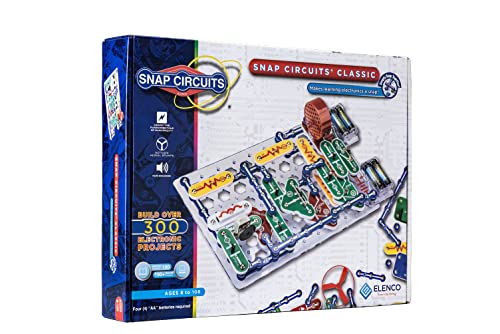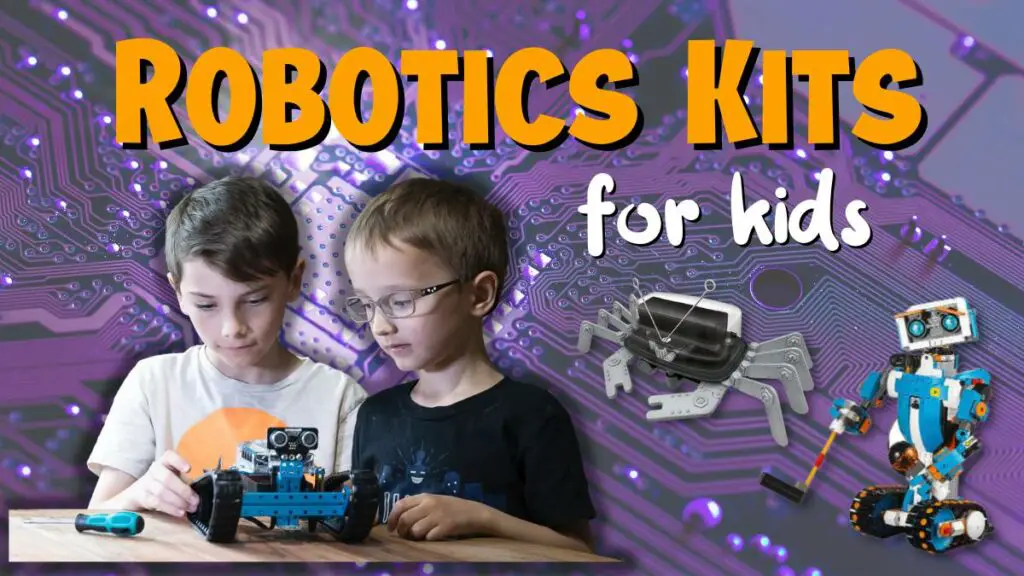If you or your child are getting into STEM, you may have come across the term and wondered “What is a STEM kit?”
The answer is simple: A STEM kit is a prepackaged box containing everything you need to do a particular STEM activity or project.
DIY STEM activities and projects are fun, though they take planning and time to prepare and gather all the materials needed. Nothing deflates enthusiasm faster than discovering you’re missing a key ingredient when your kids are excited and halfway through the project. STEM kits are easy and self-contained so you can get started right away, and ensure you have everything you need on hand to complete the activities.
Some kits are part of a series that you can start with a core kit and build upon if your child has interest. By combining elements from various kits, your child can explore and take the learning to the next level.
There are STEM and STEAM kits to satisfy almost any interest your child may have, and perhaps spark interest in new topics. If you’re budget conscious, have no fear; kits span from the reasonable ‘giftable’ price range to super deluxe. Let’s explore.
What Makes a Good STEM Kit for Kids?
With the multitude of kits available and an increasing number of toys bearing a “STEM” or “STEAM” label on the packaging, how do you know what to look for or, on the flip side, what to watch out for?
Look for quality.
Are there photos of the completed project or included parts on the packaging? Does it look sturdy, or is it something that would easily break – especially if forced together by little hands? Is it something that looks like it would frustrate you if you tried to put it together? If you’re unsure about any of these, look to the next box on the shelf or product on the list.
Know what you’re getting.
Make sure the kit isn’t something you can easily do with household objects. You don’t wan to spend $20 for what amounts to a box of plastic straws or pipe cleaners with simple instructions and a promise of building a robot. You can DIY those kind of activities, and most likely up-cycle many of the materials.
Names you can trust
Within any industry, there are names you can recognize and trust. It’s a wise choice to start there, and branch out once you have a basis for quality.
For a deeper dive, check out our STEM Activity Kit Buyers’ Guide.
Best STEM kits for Elementary
Snap Circuits
Ages 8+
When I was a kid, electronics kits looked like someone raided parts from Radio Shack and dumped them in a box. Back when Radio Shack was a thing and actually sold individual resistors, capacitors, and such. Fast forward to Snap Circuits.
Classic SC-300 Electronics Exploration Kit
Ready to take the plunge? The SC300 kit contains 300 experiments to do with 60+ parts
Basic Electricity Mini Kit
If you’d just like to dip your toes in or aren’t sure if Snap Circuits will be a hit with your child, the Basic Electricity Mini Kit is a good place to start, with 9 projects included. It’s also one of the less expensive electronic kits, so it also makes a great gift.
Makedo Cardboard Construction Toolkit
Ages: 6+ (4+ with Adult Guidance)
This Kit comes with tools, screws, and a (plastic) saw designed to work with cardboard. Ironically, a kit designed specifically to be used with cardboard boxes comes in a bag (Bring Your Own Box.)
Thankfully, cardboard boxes are easy to come by, and this is a great opportunity to let your kids build something out of materials that would otherwise end up in the recycle bin (or trash.)
This is a cool concept, and encourages kids to use their imagination to come up with a concept, then flex their design and engineering skills to figure out how to cut the cardboard, and the best way to fit the pieces together.
In our house, we’d suggest throwing a roll of duct tape into the mix, just to cover some of the seams and joints a bit more fluidly than the screws included in the kit can handle.
littleBits Base Inventor Kit
Ages 8+ (younger with Adult Guidance)
The main piece of this kit is a robotic gripper arm that is voice activated and customizable, though there are 12 projects in all, including a motion sensor alarm, Everything needed is in the kit, from a proximity sensor, servo, sound trigger, and yes, even the battery.
Little Bits are awesome. Be advised that the first kit you get is a gateway to more Little Bits.
If your kids are into Star Wars or Super Heroes, check out these littleBits (links will open in Amazon):
littleBits also has an app, so your kids can find additional ideas and inspiration or help if they get stuck.
STEM Activity Kits for Middle School
If your middle school aged child is familiar with littleBits, Legos, and the like, there may still be an interest and there are more complex kits available.
When looking for stem kits specifically for middle schoolers, age range can be an unnecessary limiting factor. Think of it more of a suggestion than a hard number. Many of these kits can see use from middle school into high school.
Tech Will Save Us, Synth Kit
Ages 13+
This STEM kit allows your kids to build three different synthesizers. This is a great kit for kids interested in music or electronics. Each synth takes about an hour or so to work through and build. Along the way there will be lessons in pitch frequency and amplitude (a potentiometer is included to control each.) The components snap together, so there is no soldering required.
Compared to some STEM kits, this one is very reasonably priced.
Best STEM Kits for High School
Most kits and toys bearing STEM or STEAM branding are geared to get kids interested in learning through play at an earlier age. That leaves high school age kids largely in the “and up” category, where some of the kits are engaging enough to hold a child’s interest as they transition into a young adult.
As we advance in age and capabilities, our “toys” also tend to become more complex. Kids in their teens are likely to appreciate some of the open source platforms available. There are kits that come with everything needed that make a great entry point before branching out and creating new projects.
Lego Mindstorm
Some of the more advanced or open ended kits like the granddaddy of STEM kits, the Lego Mindstorm. A Mindstorm should be challenging and interesting for high school age kids (or adults for that matter.)
Arduino
High Schoolers may enjoy getting into Arduino, which is an open-source electronics platform. Being open source, you can take the totally DIY approach, or you can get started with an easy to use kit. For what an Arduino unit can do, there are starter kits that are reasonably priced.

Raspberry Pi
Similar to Arduino is another open platform, Raspberry Pi. Raspberry Pi is a single board computer that runs on Linux. The credit card sized board can plug directly into a computer monitor (or TV), keyboard, and mouse. It’s another opportunity for kids to get into coding, programming, and DIY products with a small price tag.

DIY Microscope with Lego, Raspberry Pi, and Arduino
So, what can you do with some of these kits? How about a microscope? This is an awesome project, and it shows how powerful these tools can be in real world applications. IBM used Lego bricks, a Raspberry Pi, and Arduino to build a functioning powered microscope for about $300.
IBM was so proud of this project, the plans are now open source. Check out a video of the build below, and grab the plans on IBM’s Github.
Best STEM Classroom Kits
STEM kits are also available for classroom setting, where one kit may be used by a group of students to work as a team on a project.
LittleBits STEAM Student set, Up to 4-students
Yes, here’s littleBits again. These kits are geared for classroom use, and come in quantities intended for groups of between 4 to 24 students.
Don’t that that deter you from using these at home. These STEAM activities can be just as fun outside of the classroom, and your kid(s) can spend more time playing, experimenting, and building than they would typically be allotted in a class session.
LEGO Education WeDo 2.0 Core Set 45300
Plain Legos are great, but you know what’s even better? Well, yes, of course more Legos would be better, but what else? Kits like the WeDo up the ante by combining the plastic bricks are with motors, sensors, and electronics. This kit includes 280 pieces including a SmartHub, motors, and sensors.
The WeDo kit comes with a bin with compartments, so it’s easy to organize the little Lego parts. Nothing’s more frustrating when building a masterpiece, and not being able to find the one part you need.
Once again, this is intended for classroom teams, but kids would certainly love these at home as well.
Check out our post on robotics kits for kids for more STEM Kits!
STEM Kit Wrap Up
For some STEM kits, don’t let the suggested age be too much of a limiting factor, especially for littleBits and Legos (our personal favorites.) It’s okay to challenge your kids a bit, and these lines of kits have some longevity. Your child can grow with them, and you can add additional kits or pieces over time. We like toys that have a longer shelf life, rather than something kids play with for a month or two and toss in the closet or bury in the bottom of the toy box.
Related Post: STEM Subscription Boxes
If you like the idea of STEM kits, there are a number of companies that provide a monthly selection of curated experiments and activities delivered to your door (or the door of someone you’d like to send some science to each month.)











